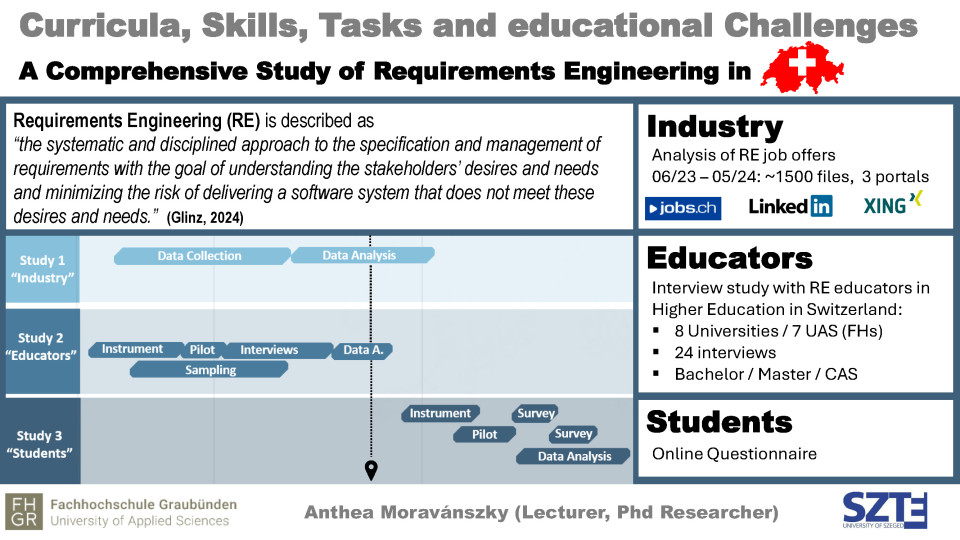Requirements Engineering (RE) has emerged as an independent discipline in recent decades and is no longer considered a peripheral topic in software engineering. RE is taught in Switzerland at Universities and Universities of Applied Sciences, including the University of Applied Sciences of the Grisons in Chur. The subject is embedded in various degree programs, including Bachelor's, Master's, and Certificates of Advanced Studies (CAS), focusing solely on RE.
However, teaching this discipline to students poses challenges for educators in higher education, as it requires developing soft skills, decision-making abilities, practical application knowledge, and theoretical content. This Ph.D. project aims to systematically investigate Requirements Engineering in Switzerland from three different perspectives: higher education institutes and educators, students, and the industry.
The first study focuses on the perspective of Switzerland's unique educational landscape, with its research universities and Universities of Applied Sciences (UAS) and their practical orientation. Course descriptions of RE courses will be gathered for quantitative comparison of ECTS, curriculum aspects, embedded degrees, and mentioned prerequisites. Interviews with educators at higher education institutions in Switzerland should get insights into the reasoning behind curricular choices, instructional approaches, and the challenges of teaching RE.
In addition to educators, the students' perspective will be explored through an online questionnaire. How did students experience their RE courses? Did they miss any prerequisites? What instructional methods helped facilitate their understanding of the practical aspects of RE? Did the course encourage them to pursue a career in RE?
The third perspective will be that of future employers in the industry. To gather that perspective, the study will analyze Swiss job advertisements from June 2023 to May 2024 from three job portals (LinkedIn, XING, and jobs.ch). This study seeks to compile a list of top skills and tasks a Requirements Engineer needs to perform. Different industry demands regarding elicitation practices, documentation methods, language qualifications, and certificates like IREB CPRE, HERMES, higher education degrees, or work experience levels will be extracted through content analysis. Regional differences will also be explored.
The results of this half-year review (data collected from XING (N=372) and LinkedIn (N=297) between July 2023 and December 2023) have already revealed some interesting insights into the evolving landscape of Requirements Engineering (RE) within the Swiss job market.
The preliminary analysis of the half-year data revealed a varied landscape of job advertisements in language and structure. Most were in German, with English accounting for 16% of the advertisements (N=92). However, the most intriguing finding was the unexpectedly low numbers of advertisements in French and Italian, with only two in French and one in Italian, all from the same company. These findings are particularly interesting, given the official language status of French and Italian in Switzerland and their respective linguistic regions. Examining certifications commonly requested in RE job advertisements strongly emphasizes industry-specific certificates, particularly those closely linked to Requirements Engineering and Project Management. The prevalence of IREB certificates, alongside other Project Management credentials like HERMES, PMI, and ITIL, suggests a growing recognition of the importance of specialized knowledge and skills in Requirements Engineering practice. However, the limited mention of Software Engineering-related certifications hints at a divergence from traditional software development pathways, indicating a shift in focus toward interdisciplinary skill sets.
The overall Ph.D. research seeks to understand how RE education in Swiss higher education is aligned with industry needs. The findings will contribute to bridging the gap between academia and industry, enhancing the preparedness of RE students for professional roles, and may improve teaching approaches in REE in Switzerland and beyond.

